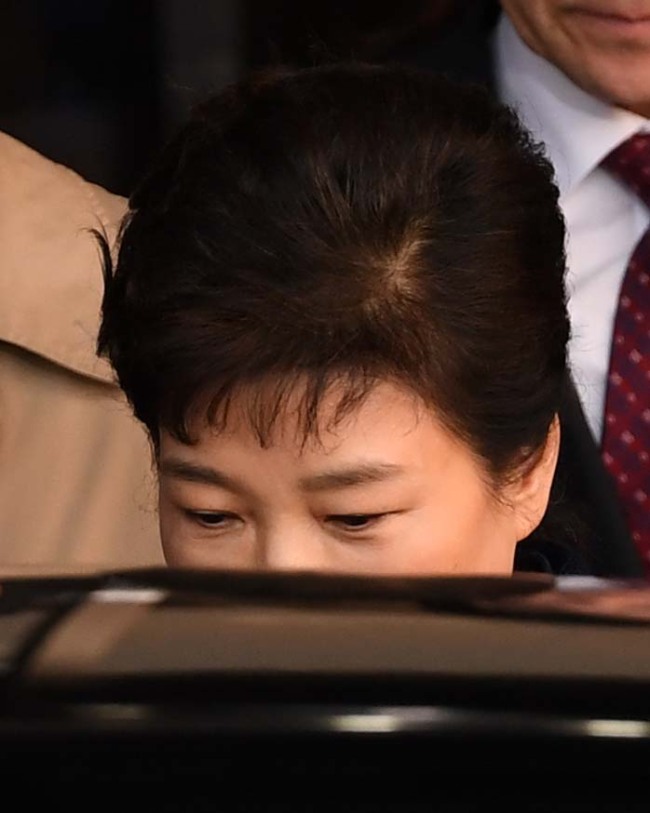Expectations mounted Thursday on the possible arrest of former President Park Geun-hye as the prosecutors, amid their cautious reticence, gestured to handle the ousted state chief’s charges in a stern and impartial manner.
“Whether to seek an arrest warrant (on Park) is an issue to be decided solely based on law and principles, as well as the progress of the investigation,” Prosecutor-General Kim Soo-nam told reporters as he arrived at the Supreme Prosecutors’ Office.
This was the first time that the chief prosecutor made a direct comment on the possible detention of the former president.

Fomer President Park Geun-hye (Yonhap)
Park, who was expelled from power on March 10 upon the Constitutional Court’s impeachment decision, returned home on Wednesday morning after a 21-hour inquiry at the Seoul Central District Prosecutors’ Office.
Her criminal charges -- including bribery, abuse of power, coercion and leak of confidential state documents -- would usually constitute reason for physical detention so as to prevent getaway or destruction of evidence.
But with the next presidential election slated for May 9, investigators have been hesitating to seek for Park’s writ, which is likely to further stir political divides ahead of the big race.
Regardless of the detention, prosecutors are expected to indict Park on her key charges as early as within this week, or by early next week at the latest, sources said.
The top prosecutor’s determined tone was nevertheless taken as a plausible sign that the investigation team will not back off in having the former president arrested.
“According to the law and principles” is investigation rhetoric often used by prosecutors to bypass questions concerning controversial cases.
When applied to Park’s case, however, this logic is likely to lead to an arrest warrant as a series of circumstantial evidence, as well as the previous arrest of key aides, have been pointing at her plausible liability.
Currently facing trial are Choi Soon-sil, the presidential confidante who stands at the heart of the entire scandal, former presidential officials Jeong Ho-seong, An Chong-bum, Kim Ki-choon, as well as former Culture Minister Cho Yoon-sun.
Lee Jae-yong, effective chief of the nation’s largest conglomerate Samsung Group, is also under trial on charges of bribery.
Kim’s remark was thus seen as reflecting the prosecutors’ vow not to be bend in to political pressure and to treat Park as a civilian, no longer as a state chief with criminal immunity.
The Constitutional Court’s ruling, which cited Park’s role in aiding Choi’s illicit profiteering as reason for impeachment, may also encourage investigators to make a bold move and file for the writ.
“(Park‘s actions) constituted a serious violation of the Constitution and of the law,” then-acting Chief Justice Lee Jung-mi said in the historical March 10 ruling.
Should all of her charges be fully recognized by the court, the ousted president may theoretically face a maximum criminal sentence of 30 years or more, mostly due to the bribery charge as defined by the Additional Punishment Law on Specific Crimes.
By Bae Hyun-jung (
tellme@heraldcorp.com)

![[Herald Interview] 'Amid aging population, Korea to invite more young professionals from overseas'](http://res.heraldm.com/phpwas/restmb_idxmake.php?idx=645&simg=/content/image/2024/04/24/20240424050844_0.jpg&u=20240424200058)




